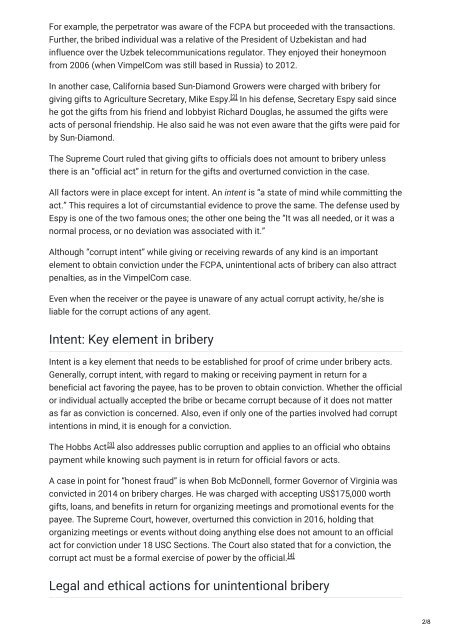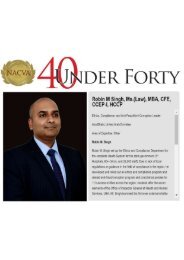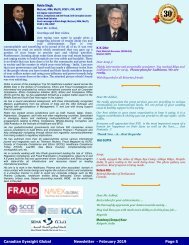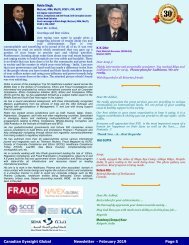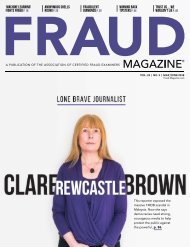complianceuniverse.org-An Unintentional Act of Bribery
Create successful ePaper yourself
Turn your PDF publications into a flip-book with our unique Google optimized e-Paper software.
For example, the perpetrator was aware <strong>of</strong> the FCPA but proceeded with the transactions.<br />
Further, the bribed individual was a relative <strong>of</strong> the President <strong>of</strong> Uzbekistan and had<br />
influence over the Uzbek telecommunications regulator. They enjoyed their honeymoon<br />
from 2006 (when VimpelCom was still based in Russia) to 2012.<br />
In another case, California based Sun-Diamond Growers were charged with bribery for<br />
giving gifts to Agriculture Secretary, Mike Espy. In his defense, Secretary Espy said since<br />
he got the gifts from his friend and lobbyist Richard Douglas, he assumed the gifts were<br />
acts <strong>of</strong> personal friendship. He also said he was not even aware that the gifts were paid for<br />
by Sun-Diamond.<br />
The Supreme Court ruled that giving gifts to <strong>of</strong>ficials does not amount to bribery unless<br />
there is an “<strong>of</strong>ficial act” in return for the gifts and overturned conviction in the case.<br />
All factors were in place except for intent. <strong>An</strong> intent is “a state <strong>of</strong> mind while committing the<br />
act.” This requires a lot <strong>of</strong> circumstantial evidence to prove the same. The defense used by<br />
Espy is one <strong>of</strong> the two famous ones; the other one being the “It was all needed, or it was a<br />
normal process, or no deviation was associated with it.”<br />
Although “corrupt intent” while giving or receiving rewards <strong>of</strong> any kind is an important<br />
element to obtain conviction under the FCPA, unintentional acts <strong>of</strong> bribery can also attract<br />
penalties, as in the VimpelCom case.<br />
Even when the receiver or the payee is unaware <strong>of</strong> any actual corrupt activity, he/she is<br />
liable for the corrupt actions <strong>of</strong> any agent.<br />
[2]<br />
Intent: Key element in bribery<br />
Intent is a key element that needs to be established for pro<strong>of</strong> <strong>of</strong> crime under bribery acts.<br />
Generally, corrupt intent, with regard to making or receiving payment in return for a<br />
beneficial act favoring the payee, has to be proven to obtain conviction. Whether the <strong>of</strong>ficial<br />
or individual actually accepted the bribe or became corrupt because <strong>of</strong> it does not matter<br />
as far as conviction is concerned. Also, even if only one <strong>of</strong> the parties involved had corrupt<br />
intentions in mind, it is enough for a conviction.<br />
[3]<br />
The Hobbs <strong>Act</strong> also addresses public corruption and applies to an <strong>of</strong>ficial who obtains<br />
payment while knowing such payment is in return for <strong>of</strong>ficial favors or acts.<br />
A case in point for “honest fraud” is when Bob McDonnell, former Governor <strong>of</strong> Virginia was<br />
convicted in 2014 on bribery charges. He was charged with accepting US$175,000 worth<br />
gifts, loans, and benefits in return for <strong>org</strong>anizing meetings and promotional events for the<br />
payee. The Supreme Court, however, overturned this conviction in 2016, holding that<br />
<strong>org</strong>anizing meetings or events without doing anything else does not amount to an <strong>of</strong>ficial<br />
act for conviction under 18 USC Sections. The Court also stated that for a conviction, the<br />
corrupt act must be a formal exercise <strong>of</strong> power by the <strong>of</strong>ficial.<br />
[4]<br />
Legal and ethical actions for unintentional bribery<br />
2/8


